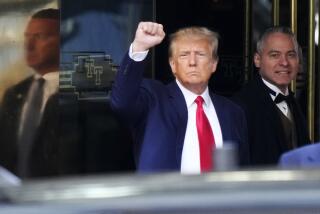Musharraf’s follies
- Share via
FOR DECADES during the Cold War, the United States supported reliably anti-communist dictators from the shah of Iran to Anastasio Somoza in Nicaragua to Ferdinand Marcos in the Philippines. This was a terrible mistake for which the U.S., and the world, paid dearly.
Yet the United States seems to be slipping back into just this sort of blind and bifurcated Cold War mentality. Replace the words “reliably anti-communist” with “reliable U.S. ally in the war on terror,” and despair at the Bush administration’s willingness to excuse heinous repression from Egypt to Saudi Arabia to Azerbaijan. Worst of all is its policy toward Pakistan, where the administration refuses to distance the U.S. from the increasingly errant autocrat Pervez Musharraf.
Nearly eight years in a presidency whose powers he has steadily expanded have made Musharraf no more of a democrat than he was when he ousted an elected government in a 1999 military coup. He has since manipulated elections, circumvented the constitution to allow himself to maintain the dual posts of president and army chief of staff and struck unholy alliances with hard-line Islamists in Parliament while assuring his U.S. backers that he was cracking down on them. He has collected $8 billion to $10 billion in direct U.S. aid for the war on terror (and perhaps almost as much in covert aid) while losing ground to the Taliban in the tribal areas that are nominally under Islamabad’s control. Terrified that Musharraf might be assassinated or overthrown by a fundamentalist Islamic regime that would inherit a nuclear arsenal, Washington has given the general the benefit of every doubt.
Now Musharraf has sacked a Supreme Court justice who appeared hostile to his scheme to rig himself a third term as president and generalissimo. Even for Pakistan’s nascent civil society, this was the last straw. This month, lawyers, rights activists and ordinary citizens demonstrated in the streets against Musharraf. Their demand? The rule of law. Yet the U.S. has been virtually mute.
The U.S. needs to show that it has a long-term commitment to the Pakistani people and an abiding interest in promoting peace, human dignity and economic development in the region. It must make clear that it will support whatever democratically chosen leader emerges in Pakistan. And as long as Musharraf resists the discipline of democracy, the United States must not pretend to give him unqualified support.
More to Read
Sign up for Essential California
The most important California stories and recommendations in your inbox every morning.
You may occasionally receive promotional content from the Los Angeles Times.










